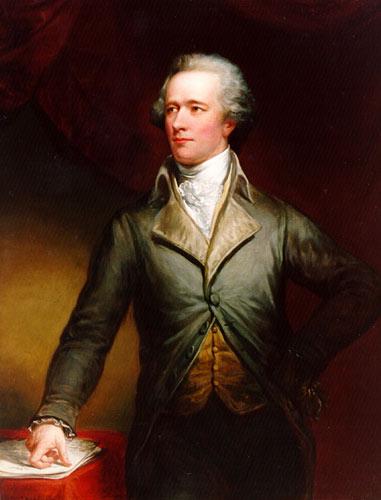|
|
Online Texts for Craig White's Literature Courses
|
|
|
Selections from The Federalist (a.k.a. The Federalist Papers) 1787-88 Federalist # 6: Concerning Dangers from Dissensions Between the States by Alexander Hamilton |
|
[6.1]
.
. . A man must be far gone in
Utopian speculations who can
seriously doubt that, if these States should either be wholly disunited, or only
united in partial confederacies, the subdivisions into which they might be
thrown would have frequent and violent contests
[controversies, combats]
with each other.
To presume a want of motives for such
contests as an argument against their existence, would be to forget that men are
ambitious, vindictive, and rapacious. [Enlightenment
skepticism re human motives]
To look for a continuation of
harmony between a number of independent, unconnected sovereignties in the same
neighborhood, would be to disregard the uniform course of human events, and to
set at defiance the accumulated experience of ages.
[Enlightenment
appeal to empirical and historical evidence;
[6.2] To multiply examples of the agency of personal
considerations in the production of great national events, either foreign or
domestic, according to their direction, would be an unnecessary waste of time. .
. . Perhaps, however, a reference, tending to illustrate the general principle,
may with propriety be made to a case which has lately happened among ourselves.
If Shays had not been a
desperate debtor,
it is much to be doubted whether
[6.3] But notwithstanding the concurring testimony of
experience, in this particular, there are still to be found visionary or
designing men [cf. “Utopian speculations” above,
6.1], who stand
ready to advocate the paradox of perpetual peace between the States, though
dismembered and alienated from each other.
The genius of
republics (say they) is pacific; the spirit of commerce has a tendency to soften
the manners of men, and to extinguish those inflammable humors which have so
often kindled into wars. Commercial republics, like ours, will never be disposed
to waste themselves in ruinous contentions with each other. They will be
governed by mutual interest, and
will cultivate a spirit of mutual amity and concord.
[6.4] [<after stating his opponents case,
[6.6] In the government of
[6.7] There have been, if I may so express it, almost as
many popular as royal wars.
The cries of the nation [its people]
and the importunities
[insistent demands]
of their representatives
have, upon various occasions, dragged their monarchs into war, or continued them
in it, contrary to their inclinations, and sometimes contrary to the real
interests of the State. . . .
[6.8] The wars of these two last-mentioned nations
[Austria & Bourbon France]
have in a great measure grown
out of commercial considerations,--the desire of supplanting and the fear of
being supplanted, either in particular branches of traffic or in the general
advantages of trade and navigation.
[6.9] From this summary of what has taken place in other
countries, whose situations have borne the nearest resemblance to our own, what
reason can we have to confide in those reveries
[cf. “Utopian speculations,” 6.1]
which would seduce us into an expectation of peace and
cordiality between the members of the present confederacy, in a state of
separation? Have we not already seen enough of the fallacy and extravagance of
those idle theories which have amused us with promises of an exemption from the
imperfections, weaknesses and evils incident to society in every shape?
Is it not time to awake from the
deceitful dream of a golden age [Enlightenment
reaction against imagination over reason],
and to adopt as a practical maxim for
the direction of our political conduct that we, as well as the other inhabitants
of the globe, are yet remote from the happy empire of perfect wisdom and perfect
virtue? [human perfectability is not
part of the Enlightenment or
the
Constitution
(which advances "a more perfect
union" but not a "perfect union." Rather, the
Enlightenment & the Constitution admit human imperfection and irrationality, and
attempt to restrain or balance such qualities against humanity's virtues.]
. . .
PUBLIUS.



